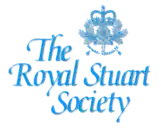Royal Stuart Society
The Royal Stuart Society, founded in 1926, is the largest extant Jacobite organization in the United Kingdom. Its full name is The Royal Stuart Society and Royalist League, although it is best known simply as the "Royal Stuart Society". It acknowledges Francis, Duke of Bavaria as head of the House of Stuart, while refraining from making any claim on his behalf that he does not make himself.
 | |
| Abbreviation | RSS |
|---|---|
| Formation | 1926 |
| Type | Monarchist, Traditionalist |
| Headquarters | Walsingham, Norfolk, England |
Governor-General | Murray Beauclerk, 14th Duke of St. Albans |
| Website | royalstuartsociety.com |
The society organises annual events to commemorate the major anniversaries of Jacobitism and other events of Royalist interest.
History
After the First World War, the Jacobite movement was in disarray. The Royal Stuart Society was established by Captain Henry Stuart Wheatly-Crowe, who served as its first Governor-General, and representatives of the Royalist Association and other defunct or moribund bodies that supported the Jacobite succession to the British throne.
The Royal Stuart Society considers itself a successor to, and effectively the continuation of, bodies of the Neo-Jacobite Revival, such as the Legitimist Jacobite League of Great Britain and Ireland (founded in 1891 by Herbert Vivian, Ruaraidh Erskine and Melville Henry Massue), the Order of the White Rose and the Thames Valley Legitimist Club. Among its other founders were Lionel Erskine-Young, 29th Earl of Mar (1891–1965) and Reginald Lindesay-Bethune, 12th Earl of Lindsay (1867–1939).[1]
Objectives
The objectives of the Royal Stuart Society are as follows: (1) to be open to all who have an interest in the members of the Royal House of Stuart, their descendants and supporters; (2) to promote research in and further knowledge of Stuart history; (3) to uphold rightful Monarchy and oppose republicanism; and (4) to arrange such commemorations, lectures and other activities as shall advance these objects. It describes itself on its website as being “monarchist and traditionalist”.[2]
Leadership
As of 2023, the Governor-General is Murray Beauclerk, 14th Duke of St. Albans, a descendant of Stuart monarch King Charles II and his mistress, Nell Gwyn, through their illegitimate son, Charles Beauclerk, 1st Duke of St. Albans. His son, Charles Beauclerk, Earl of Burford, is also a Vice-President of the Society.[3]
Other Vice-Presidents of the Royal Stuart Society include:
- Princess Lew Sapieha, a Polish-Lithuanian noble
- Prince Filippo Rospigliosi, 12th Earl of Newburgh, a Scottish peer
- Patrick Cormack, Baron Cormack DL, FSA, FRHistS, a British politician, historian, journalist and author
- Count Nikolai Tolstoy FRSL, a British monarchist and historian, and current nominal head of the House of Tolstoy
- Ian Maitland, 18th Earl of Lauderdale, a Scottish peer
- Peter de Vere Beauclerk-Dewar, the author of The House of Nell Gwyn – the fortunes of the Beauclerk Family 1670-1974 (1975)
- Lucius Cary, 15th Viscount Falkland, a British nobleman and politician
- Edward Corp, former Professor of British History at the University of Toulouse in Toulouse, France
- Lady Antonia Fraser CH, DBE, FRSL, a British author of history, novels, biographies and detective fiction
Activities

The Society organises a variety of events throughout the year. An important part of these events are the commemorations in Whitehall, Windsor and Westminster Abbey. Details of all these events, many of which are open to the public who are always made welcome, appear on the Society's website.
A service to commemorate the execution of King Charles I is held at his statue in Trafalgar Square on 30 January each year, and a wreath is later laid on behalf of the Society on the King's tomb at St George's Chapel, Windsor, at the beginning of Choral Evensong. The execution of Mary, Queen of Scots is remembered with a Service at her tomb in Westminster Abbey on 8 February. The nativity of King James VII and II of Scotland and England is marked by prayers and the laying of flowers at his statue outside the National Gallery on 14 October.
The Society also holds an annual dinner, which commemorates Restoration Day and White Rose Day, with the white rose being a symbol of Jacobitism. An informal party for members is usually held in November. The Society's lectures take place at the parish hall of the Jesuit church at Farm Street in London's Mayfair.
Newsletters with details of people, events, and news of the Society are produced and edited by the Principal Secretary, and sent to members during the year. The Society publishes the Royal Stuart Journal annually, and this is available to non-members via the website. The Journal replaced a series of publications called Royal Stuart Papers (still available from the Society), which included papers by a number of well known historians, such as Roy Porter, Richard Sharpe, Murray Pittock, Eveline Cruickshanks, Lady Antonia Fraser, and Ronald Hutton.[2]
References
- Robert FJ Parsons, The Role of Jacobitism in the Modern World (Royal Stuart Society, Huntingdon, 1986).
- "The Royal Stuart Society".
- "About the Royal Stuart Society". The Royal Stuart Society. Retrieved 16 October 2023.
